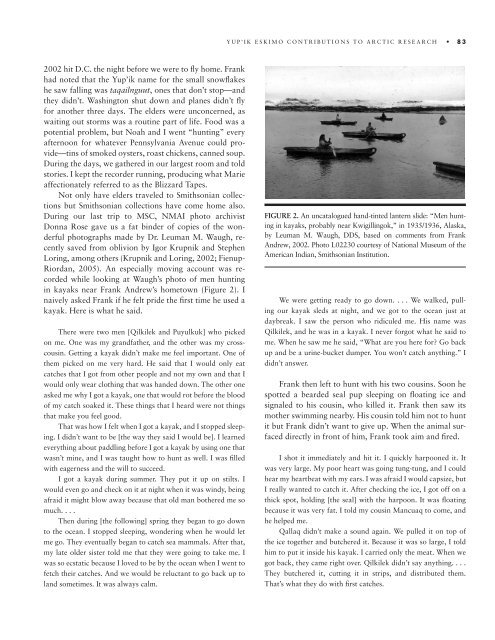Smithsonian at the Poles: Contributions to International Polar
Smithsonian at the Poles: Contributions to International Polar
Smithsonian at the Poles: Contributions to International Polar
Create successful ePaper yourself
Turn your PDF publications into a flip-book with our unique Google optimized e-Paper software.
2002 hit D.C. <strong>the</strong> night before we were <strong>to</strong> fl y home. Frank<br />
had noted th<strong>at</strong> <strong>the</strong> Yup’ik name for <strong>the</strong> small snowfl akes<br />
he saw falling was taqailnguut, ones th<strong>at</strong> don’t s<strong>to</strong>p— and<br />
<strong>the</strong>y didn’t. Washing<strong>to</strong>n shut down and planes didn’t fl y<br />
for ano<strong>the</strong>r three days. The elders were unconcerned, as<br />
waiting out s<strong>to</strong>rms was a routine part of life. Food was a<br />
potential problem, but Noah and I went “hunting” every<br />
afternoon for wh<strong>at</strong>ever Pennsylvania Avenue could provide—<br />
tins of smoked oysters, roast chickens, canned soup.<br />
During <strong>the</strong> days, we g<strong>at</strong>hered in our largest room and <strong>to</strong>ld<br />
s<strong>to</strong>ries. I kept <strong>the</strong> recorder running, producing wh<strong>at</strong> Marie<br />
affection<strong>at</strong>ely referred <strong>to</strong> as <strong>the</strong> Blizzard Tapes.<br />
Not only have elders traveled <strong>to</strong> <strong>Smithsonian</strong> collections<br />
but <strong>Smithsonian</strong> collections have come home also.<br />
During our last trip <strong>to</strong> MSC, NMAI pho<strong>to</strong> archivist<br />
Donna Rose gave us a f<strong>at</strong> binder of copies of <strong>the</strong> wonderful<br />
pho<strong>to</strong>graphs made by Dr. Leuman M. Waugh, recently<br />
saved from oblivion by Igor Krupnik and Stephen<br />
Loring, among o<strong>the</strong>rs (Krupnik and Loring, 2002; Fienup-<br />
Riordan, 2005). An especially moving account was recorded<br />
while looking <strong>at</strong> Waugh’s pho<strong>to</strong> of men hunting<br />
in kayaks near Frank Andrew’s home<strong>to</strong>wn (Figure 2). I<br />
naively asked Frank if he felt pride <strong>the</strong> fi rst time he used a<br />
kayak. Here is wh<strong>at</strong> he said.<br />
There were two men [Qilkilek and Puyulkuk] who picked<br />
on me. One was my grandf<strong>at</strong>her, and <strong>the</strong> o<strong>the</strong>r was my crosscousin.<br />
Getting a kayak didn’t make me feel important. One of<br />
<strong>the</strong>m picked on me very hard. He said th<strong>at</strong> I would only e<strong>at</strong><br />
c<strong>at</strong>ches th<strong>at</strong> I got from o<strong>the</strong>r people and not my own and th<strong>at</strong> I<br />
would only wear clothing th<strong>at</strong> was handed down. The o<strong>the</strong>r one<br />
asked me why I got a kayak, one th<strong>at</strong> would rot before <strong>the</strong> blood<br />
of my c<strong>at</strong>ch soaked it. These things th<strong>at</strong> I heard were not things<br />
th<strong>at</strong> make you feel good.<br />
Th<strong>at</strong> was how I felt when I got a kayak, and I s<strong>to</strong>pped sleeping.<br />
I didn’t want <strong>to</strong> be [<strong>the</strong> way <strong>the</strong>y said I would be]. I learned<br />
everything about paddling before I got a kayak by using one th<strong>at</strong><br />
wasn’t mine, and I was taught how <strong>to</strong> hunt as well. I was fi lled<br />
with eagerness and <strong>the</strong> will <strong>to</strong> succeed.<br />
I got a kayak during summer. They put it up on stilts. I<br />
would even go and check on it <strong>at</strong> night when it was windy, being<br />
afraid it might blow away because th<strong>at</strong> old man bo<strong>the</strong>red me so<br />
much. . . .<br />
Then during [<strong>the</strong> following] spring <strong>the</strong>y began <strong>to</strong> go down<br />
<strong>to</strong> <strong>the</strong> ocean. I s<strong>to</strong>pped sleeping, wondering when he would let<br />
me go. They eventually began <strong>to</strong> c<strong>at</strong>ch sea mammals. After th<strong>at</strong>,<br />
my l<strong>at</strong>e older sister <strong>to</strong>ld me th<strong>at</strong> <strong>the</strong>y were going <strong>to</strong> take me. I<br />
was so ecst<strong>at</strong>ic because I loved <strong>to</strong> be by <strong>the</strong> ocean when I went <strong>to</strong><br />
fetch <strong>the</strong>ir c<strong>at</strong>ches. And we would be reluctant <strong>to</strong> go back up <strong>to</strong><br />
land sometimes. It was always calm.<br />
YUP’IK ESKIMO CONTRIBUTIONS TO ARCTIC RESEARCH 83<br />
FIGURE 2. An unc<strong>at</strong>alogued hand-tinted lantern slide: “Men hunting<br />
in kayaks, probably near Kwigillingok,” in 1935/1936, Alaska,<br />
by Leuman M. Waugh, DDS, based on comments from Frank<br />
Andrew, 2002. Pho<strong>to</strong> L02230 courtesy of N<strong>at</strong>ional Museum of <strong>the</strong><br />
American Indian, <strong>Smithsonian</strong> Institution.<br />
We were getting ready <strong>to</strong> go down. . . . We walked, pulling<br />
our kayak sleds <strong>at</strong> night, and we got <strong>to</strong> <strong>the</strong> ocean just <strong>at</strong><br />
daybreak. I saw <strong>the</strong> person who ridiculed me. His name was<br />
Qilkilek, and he was in a kayak. I never forgot wh<strong>at</strong> he said <strong>to</strong><br />
me. When he saw me he said, “Wh<strong>at</strong> are you here for? Go back<br />
up and be a urine-bucket dumper. You won’t c<strong>at</strong>ch anything.” I<br />
didn’t answer.<br />
Frank <strong>the</strong>n left <strong>to</strong> hunt with his two cousins. Soon he<br />
spotted a bearded seal pup sleeping on fl o<strong>at</strong>ing ice and<br />
signaled <strong>to</strong> his cousin, who killed it. Frank <strong>the</strong>n saw its<br />
mo<strong>the</strong>r swimming nearby. His cousin <strong>to</strong>ld him not <strong>to</strong> hunt<br />
it but Frank didn’t want <strong>to</strong> give up. When <strong>the</strong> animal surfaced<br />
directly in front of him, Frank <strong>to</strong>ok aim and fi red.<br />
I shot it immedi<strong>at</strong>ely and hit it. I quickly harpooned it. It<br />
was very large. My poor heart was going tung-tung, and I could<br />
hear my heartbe<strong>at</strong> with my ears. I was afraid I would capsize, but<br />
I really wanted <strong>to</strong> c<strong>at</strong>ch it. After checking <strong>the</strong> ice, I got off on a<br />
thick spot, holding [<strong>the</strong> seal] with <strong>the</strong> harpoon. It was fl o<strong>at</strong>ing<br />
because it was very f<strong>at</strong>. I <strong>to</strong>ld my cousin Mancuaq <strong>to</strong> come, and<br />
he helped me.<br />
Qallaq didn’t make a sound again. We pulled it on <strong>to</strong>p of<br />
<strong>the</strong> ice <strong>to</strong>ge<strong>the</strong>r and butchered it. Because it was so large, I <strong>to</strong>ld<br />
him <strong>to</strong> put it inside his kayak. I carried only <strong>the</strong> me<strong>at</strong>. When we<br />
got back, <strong>the</strong>y came right over. Qilkilek didn’t say anything. . . .<br />
They butchered it, cutting it in strips, and distributed <strong>the</strong>m.<br />
Th<strong>at</strong>’s wh<strong>at</strong> <strong>the</strong>y do with fi rst c<strong>at</strong>ches.

















